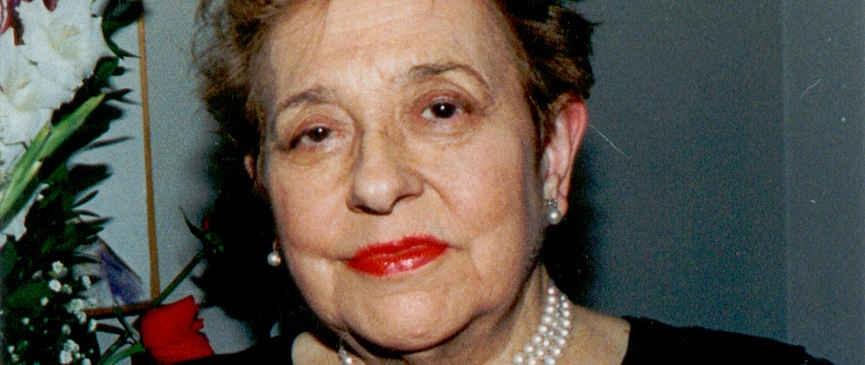You are in:
Laureates
Start of main content
Alicia de Larrocha
Prince of Asturias Award for the Arts 1994

Daughter and niece of pupils of Enrique Granados, from a very early age Alicia de Larrocha de la Calle (Barcelona, Spain, 1923 – 2009) grew up in a musical environment. Shortly after, this was complemented by sound teachings from the person who was to continue the work of the Granados Academy, his pupil Frank Marshal. There she was to meet Arthur Rubinstein, Emil von Sauer, Alfred Cortot and other great pianists of the time. She made her first public appearance in May 1929 at the Marshall Academy in Barcelona, performing works by Bach, Mozart and Granados.
Although she progressively gave short recitals, she was to make her debut with an orchestra in 1936 alongside Maestros Joan Lamote de Grignon, in Barcelona (in October 1934) and Enrique Fernández Arbós, in Madrid (in April 1936).
Her incipient career was interrupted by the Spanish Civil War (1936-1939), a hiatus she took advantage of to study new works for her repertoire and compose some pieces for her youth. From 1940 to 1946, she gave concerts only in Spain, her first recital abroad taking place in 1947 in Lausanne (Switzerland).
After 1939, she began to be invited to play with European Musical Societies and orchestras. One of her fondest memories was her collaboration in 1950 with composer and pianist Francis Poulenc, performing –alongside him– his Concerto for Two Pianos at the Palau de la Música Catalana in Barcelona. She also treasured endearing collaborations with singers (such as Conchita Badía, Victoria de los Ángeles, Pilar Lorengar, Montserrat Caballé and Josep Carreras, with whom she maintained a great friendship), cellists (such as Gaspar Cassadó, from the end of 1956 until late 1958), violinists (of the stature of Giovani Bagarotti) and chamber ensembles (among which the Guarneri String Quartet and The Tokyo String Quartet stand out). She made her debut in the USA in 1954, when Alfred Wallenstein invited her to tour with the Los Angeles Philharmonic Orchestra, interpreting Mozart’s Piano Concerto KV 488 and Manuel de Falla’s Nights in the Gardens of Spain. From that moment on, she performed at the most prestigious festivals alongside the greatest orchestras and conductors of world renown. In 1959, the year of the death of her teacher Frank Marshall, Alicia de Larrocha assumed the direction of the Marshall Academy (the continuation of the Granados Academy), where, in addition to supervising the teaching at the centre, she also gave piano master classes, especially music by Spanish composers, whenever her extensive schedule allowed her to do so. In 1979, she celebrated the 50th anniversary of her first public appearance, performing –on three consecutive days– all 5 Beethoven Concertos together with the Pittsburgh Symphony Orchestra, conducted by Andre Previn, in Pennsylvania and also in New York. Alicia de Larrocha enjoyed a very intense piano career, giving almost 4000 concerts around the world, mainly in Europe, Japan and, above all, the United States. The period in which she gave the most recitals was from the late 1960s to the 90s, but her schedule was certainly fullest in the 80s and 90s, during which she gave more than 100 concerts a year. She was well-known as a pianist for her interpretations of music by Spanish composers (Granados, Albéniz, Falla, Turina, Padre Soler, etc.), but she was also a great interpreter of an extensive repertoire that included works by composers such as Bach, Handel, Couperin, Scarlatti, Haydn, Mozart, Beethoven, Schubert, Schumann, Liszt, Chopin, Brahms, Rachmaninoff, Debussy, Ravel, Fauré, Poulenc, Katchaturian, Ginastera, Rodrigo, Suriñach, Montsalvatge, Mompou, Nin-Culmell, Esplá and Balada.
In 2001, the centenary year of the founding of the Granados Academy (which was renamed the Marshall Academy in 1920), Alicia de Larrocha directed and revised a new edition of Enrique Granados’ entire body of work for piano, published by Editorial Boileau in Barcelona. One of her most cherished memories was her collaboration with Francis Poulenc in Barcelona, performing his “Concert for Two Pianos”. She also valued and cherished her numerous collaborations with singers, violoncellists, violinists and chamber ensembles. Her concert tours covered the five continents, until she definitively withdrew from the stage in 2003. She was awarded honorary doctorates by the Universities of Michigan, Middlebury College-Vermont and Carnegie Mellon (USA), she was an Honorary Member of the Royal Academy of Fine Arts of San Fernando in Madrid (1981), of the Academy of Our Lady of Anguish in Granada (1994) and of the Royal Academy of Saint George in Barcelona (2000), as well as Commander of France’s Order of Arts and Letters (Paris, 1988). She held the Gold Medal for Merit in Fine Arts (Madrid, 1982), the Guerero Foundation of Spanish Music Award (Madrid, 1999) and the UNESCO Prize (Paris, 1995) among many other distinctions. Her recording career was recognised with four Grammy Awards (Burbank, Ca., 1974, 1975, 1988, 1991); three Edison Awards (Amsterdam, 1968, 1978, 1989); two Grand Prix du Disque (Paris, 1960, 1974); two Records of the Year (London, 1971, 1974); a Deutsche Schallplattenpreis (Hamburg, 1979) and a Franz Liszt Award (Budapest, 1980). Alicia de Larrocha passed away in Barcelona on 25th September 2009 at the age of 86.
End of main content
Sección de utilidades
Fin de la sección de utilidades
- Legal document Legal document (Access key 8)
- | Privacy policy Privacy policy (Access key )
- | Social networks ???en.portal.pie.menu107.title???
- | Cookies ???en.portal.pie.menu110.title???
- | Site map Site Map (Access key 3)
- | Contact Contact (Access key )
- | XHTML 1.0
- | CSS 2.1
- | WAI 'AA
© Copyright 2024. FUNDACIÓN PRINCESA DE ASTURIAS



